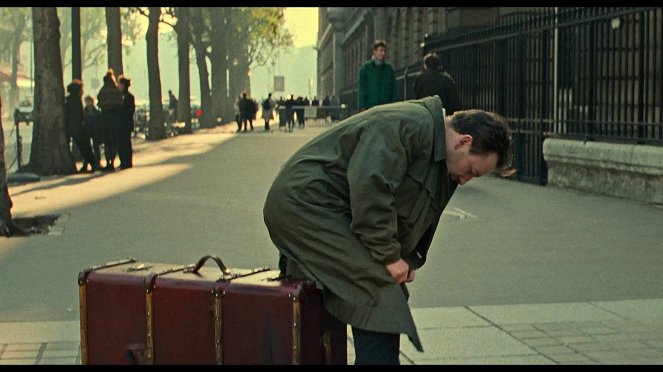Regie:
Krzysztof KieslowskiKamera:
Sławomir IdziakMusik:
Zbigniew PreisnerBesetzung:
Juliette Binoche, Benoît Régent, Florence Pernel, Charlotte Véry, Hélène Vincent, Philippe Volter, Claude Duneton, Hugues Quester, Emmanuelle Riva (mehr)Streaming (1)
Inhalte(1)
Als Julie ihren Mann und ihre Tochter bei einem Autounfall verliert, verkauft sie das Landhaus der Familie und zieht in eine kleine Pariser Wohnung. Dort versucht sie, sich von der Vergangenheit zu lösen. Bei einem Autounfall verliert Julie ihren Mann Patrice, einen berühmten Komponisten, und ihre kleine Tochter Anna. Julie stürzt durch die Tragödie in eine tiefe Krise und entschließt sich schließlich, ihrer Trauer und der Einsamkeit in die Anonymität der Großstadt zu entfliehen. Sie verkauft alles, was sie hat, und bezieht eine kleine Wohnung in Paris. Doch die Flucht ist nicht von langer Dauer, denn eine Musikjournalistin äußert den Verdacht, Julie habe in Wirklichkeit das berühmte Werk ihres Mannes komponiert. Patrices Assistent Olivier, der Julie schon seit langer Zeit liebt, beschließt, das unvollendete Konzert zum Abschluss zu bringen. Damit gelingt es ihm, Julie aus der Isolation zu verhelfen – und ihre Liebe zu gewinnen. (arte)
(mehr)Videos (2)
Kritiken (5)
Kieślowski hat für den Anfang seiner Farbentrilogie die dramatischste Geschichte ausgesucht. Ich bin der Meinung, dass es eine gute Entscheidung war. Juliette Binoche spielt die Witwe des Komponisten perfekt. Ihre traurige Welt nahm mich ganz gefangen. Sie ist meist still. Hin und wieder wird sie aber von etwas gestört – von der Melodie eines ebenso einsamen Straßenflötisten, Fragmenten der unvollendeten Komposition ihres Mannes, einem Ex-Freund, vor dem Julie (so wie vor dem Rest der Welt) weglaufen wollte, der uneingeladenen Mäusefamilie in der Wohnung, von Besuchen bei ihrer Mutter… Die Geschichte ist zwar – so wie die blaue Farbe – kalt, sie hat aber eine Reihe von Tönen, die man durchforschen muss. Was wenn man unter ihnen einen findet, der tausendmal besser als alle anderen Farben der Welt ist? Ich möchte nicht nur die Regie und die Schauspieler*innen, sondern auch Preisners hervorragende Musik loben, die bestimmt die Hälfte der Wirkung ausmacht. Es ist nur schade, dass der Film manchmal so langwierig ist.
()
Kieslowski proves that he is not only a perceptive and sensitive individual, but also a creator with a strong visual sense. Many scenes that could easily be retold in an "ordinary" way without losing their meaning become an artistic experience under his hands. Even a sugar cube dissolving in coffee can be beautiful. But in truth, the main driver here is not Kieslowski, but the divine performance of Juliette Binoche, her economical acting, which, although devoid of expressive gestures (one wants to say thankfully), nevertheless radiates emotion and inner strength. I believed everything. I’m keeping the fifth star for the rest of the “colours” (I still haven’t watched them). Maybe the best is yet to come. :)
()
In my review of Three Colours: Red, I wrote that it is the most sympathetic and probably the best part of the trilogy. However, when it comes to Blue, the substance is thematically closest to me. Kieslowski conceived the discourse on freedom as a problem of emotional and familial relations. They tie us with invisible but strong emotional bonds. The main protagonist loses her family in a car accident and deals with the problem of to what extent she can free herself from her memories and feelings. Her neighbor works in the erotic industry and feels satisfied with it until her father shows up at her performance and she confronts feelings of guilt because she is not liberated from her past and family affiliation. To free oneself can mean to isolate oneself, and it is always just a question of compromise between independence and solitude. At the age of 18, I lost my father and I was dealing with a similar dilemma as the protagonist of the film. Kieslowski is, as always, intimate, delivering his story at a slow pace with an emphasis on the inner psyche of his characters. Overall impression: 75%.
()
It's actually quite similar to the main character - beautiful, but a bit academically dry. Yet it's sympathetic and playful, and formalists will swoon over it. The ways in which Kieślowski fools around with the scene, angles, and colors actually create a terribly fun experience. Just like with Tarkovsky or Tarr, I argue here that the others are the boring ones.
()
Kieślowski is simply such a unique filmmaker, with his own vision and poetic style, that if you liked one of his films, you'll likely enjoy the others as well. Not because they are entertaining (humorous), but because they have a story to tell. The plot always has something to say, both in story and characters, with Juliette Binoche being incredible.
()




Werbung